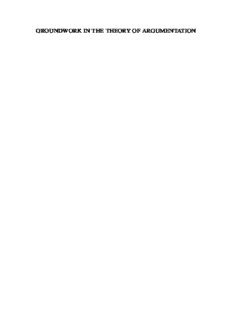Table Of ContentGROUNDWORKINTHETHEORYOFARGUMENTATION
Argumentation Library
VOLUME 21
SeriesEditors
FransH.vanEemeren,UniversityofAmsterdam,TheNetherlands
ScottJacobs,UniversityofIllinoisatUrbana-Champaign,USA
ErikC.W.Krabbe,UniversityofGroningen,TheNetherlands
JohnWoods,UniversityofBritishColumbia,Vancouver,Canada
Forfurthervolumes:
http://www.springer.com/series/5642
GROUNDWORK IN
THE THEORY OF
ARGUMENTATION
Selected Papers of J. Anthony Blair
J. Anthony Blair
UniversityofWindsor,Windsor,ON,Canada
Introduction by Christopher W. Tindale
123
J.AnthonyBlair
CentreforResearchinReasoning,
Argumentation&Rhetoric
UniversityofWindsor
401SunsetAvenue
Windsor,Ontario
CanadaN9B3P4
[email protected]
ISSN1566-7650
ISBN978-94-007-2362-7 e-ISBN978-94-007-2363-4
DOI10.1007/978-94-007-2363-4
SpringerDordrechtHeidelbergLondonNewYork
LibraryofCongressControlNumber:2011936861
©SpringerScience+BusinessMediaB.V.2012
Nopartofthisworkmaybereproduced,storedinaretrievalsystem,ortransmittedinanyformorby
anymeans,electronic,mechanical,photocopying,microfilming,recordingorotherwise,withoutwritten
permissionfromthePublisher,withtheexceptionofanymaterialsuppliedspecificallyforthepurpose
ofbeingenteredandexecutedonacomputersystem,forexclusiveusebythepurchaserofthework.
Printedonacid-freepaper
SpringerispartofSpringerScience+BusinessMedia(www.springer.com)
Preface
Thechapterscomprisingthisbookarepaperschosentorepresentthespanovertime
andtherangeovertopicsofmyscholarlypublicationsduringthepast30orsoyears.
Theyvaryinlengthfromshorttolong,andinstylefromchattytotechnical.Allbut
the first have been previously published, but they are scattered among a variety of
sources, some out of print, others difficult to access. So this book brings together
in one place a fairly representative sample of my thinking over that period about
informallogic,reasoning,criticalthinking,argument,argumentation,dialecticand
rhetoric.
Thechaptersaregroupedintofourpartsbybroadtopic.Theparts,andthechap-
terswithinthemare,withseveralexceptions,inroughlychronologicalorder.Each
part begins with a brief Introduction explaining what motivated the chapters in it,
andendswithabriefPostscriptstatingwhereInowstandoneachone.
Windsor,ON,Canada J.AnthonyBlair
v
ThisisBlankPageIntegra vi
Acknowledgements
SeveralpeoplehaveforsometimesuggestedthatIshouldpublishaselectionofmy
papers.ThefirstwasRobertPinto,followedsoonbyHansHansenandthenFrans
vanEemeren.WhenChristopherTindalemovedtoWindsor,headdedhisvoice,as
recentlysodidFrankZenker.Ayearago,Frank,HansandChrispressedmetoact,
withChriscommittingtoservingasmyeditorialadvisor.Fransthensuggestedthe
projectforSpringer’sArgumentationLibrarybookseries.Ioweallthesefriendsand
colleagues my thanks for encouraging and supporting this venture. Special thanks
toChrisfortakingthetimefromhisbusyteaching,researchandtravelscheduleto
adviseabouttheselectionandorganization,toreadtheentirecontents,towritethe
Introduction,tocopyeditandgenerallyshepherdthebookalong.
Thesepapershavebeenwrittenovermyacademiccareer.Mycolleaguesatthe
University of Windsor, first Ralph Johnson, Bob Pinto, and Kate Parr, later Hans
Hansen and Chris Tindale, and most recently the resident and visiting Fellows of
theCentreforResearchinReasoning,ArgumentationandRhetoric,haveafforded
through their conversation and constructive critical advice an ideal atmosphere in
whichtodevelopideas.IamparticularlygratefultoRalph,withwhomforover40
yearsIhavehadwhathastobethebestmutuallysupportivecollaborativescholarly
relationshipthatcanbeimagined.IalsothankFransvanEemeren,whoinvolvedme
fromthebeginningintheInternationalSocietyfortheStudyofArgumentation,the
ISSAconferences,andotherworkingvisitstotheUniversityofAmsterdam,thereby
affordingmeaprivilegedvantagepointintheargumentationscholarlycommunity
fromtheearliestdaysofits20thcenturyrenaissance.
IamgratefultomyphilosophyteachersatMcGillandMichigan.Therearemany
tothankfortheirinfluenceamongCanadianandAmericanphilosophers,butIwould
singleoutDavidHitchcock,TrudyGovier,LeoGroarke,MichaelGilbert,Douglas
WaltonandJohnWoodsinCanada,andRobertEnnis,MauriceFinocchiaro,James
Freeman,NicholasRescher,MichaelScriven,andHarveySiegel,intheU.S.Among
speechcommunicationscholars:ThomasGoodnight,JeanGoodwin,SallyJackson,
Scott Jacobs, the late Michael Leff, Barbara O’Keefe, Daniel O’Keefe, Joseph
Wenzel, Charles Arthur Willard and David Zarefsky. Among European schol-
ars: especially Frans van Eemeren and the late Rob Grootendorst, but also Alec
Fisher, the late Peter Houtlosser, Erik Krabbe and Francisca Snoeck Henkemans.
vii
viii Acknowledgements
And I particularly thank Michael Scriven for, besides his scholarly influence, his
encouragementandsupportformorethan30years.
As well, I am grateful for many generations of undergraduate and graduate
studentswhoseinterestinthesetopicsandhardworkwerealwaysencouraging.
AlthoughIcannotherenamethem,Iamsensibleofmydebttotheadministrative
officers and support staff at the University of Windsor over my career there. They
have been extremely helpful to me and supportive of my academic projects and
activities.
Thanks also to Joshua Chauvin for making electronic copies of several old
papers,toGovindUpadyayulaforamalgamatingthereferencesfromallthechapters
inonefile,toIndumadhiSrinivasanofIntegraSoftwareServices,andtoNeilOliver,
DianaNijenhuijzenatSpringerfortheirpartsinbringingthisbooktopublication.
Ihavesavedtheexpressionofmydeepestgratitudetothelast.Ithankmywife,
JuneBlair,forherunfailingsupport,herloyalty,herencouragement,hersacrifices,
andaboveall,herlove.Idedicatethisbooktoher.
Windsor,ON,Canada J.AnthonyBlair
Introduction
PhilosopherofArgument
Few names command a stronger association with recent trends in argumentation
theoryandparticularlyinformallogicthanthatofJ.AnthonyBlair.Sincetheearly
1970shehasstoodattheforefrontofpedagogicalandtheoreticalworkininformal
logic, and since the early 1980s has been an international figure in the growing
field of argumentation studies. That such a reputation as a leader of considerable
stature is well deserved will be borne out by the chapters collected here, covering
30yearsofactivityfrom1981to2011.Blair’sworkisamirrorreflectingtheideas
and issues that have occupied argumentation theorists over the last three decades,
andthereaderwilldetectanemergingcomplexityofthoughtasproblemsbecome
identified,carefullyexplored,andthensolutionsoffered.
The voice you will hear talking in these pages is that of a trained philosopher
(fromMcGillUniversityinMontrealandtheUniversityofMichigan)inconversa-
tionwitharangeofaudiences,butmostparticularlyconcernedtopersuadehimself
oftheroutes hetakes andtheconclusions hedraws.Inastyleatonceaustereand
intimateBlairstartsmanyexplorationsfromthegroundup.Weseethisinthestudy
of bias (Chapter 3), where he begins disentangling the various types of bias that
may exist, and clarifying meanings for the reader before proceeding to offer his
observations.Andina1992paperonpremissaryrelevance(Chapter6),heusesthe
openingpagestosetdownhowsomeonewouldexploretheveryactofarguing.Thus
asanintroductiontonotjustthesubjectofargumentationbuthowtothinkaboutit
intelligently,Blair’sworkisahandbookofinsightandinstruction.Throughoutthe
chapters, we observe a dedicated scholar reasoning through some basic problems
in argumentation theory, opening doors, and inviting reflection, comment and dis-
agreement.Theconclusionsareoftententativeandalerttotheneedforcontinuing
work on a topic. But at the same time many of the observations are clearly pre-
scient,anticipatingquestionsthatwillcometoformtheresearchagendasofothers
orpointingtotheimportanceofatopic(likeargumentationschemes)thatwilllater
becomeapopularsubjectforthecommunitytodiscuss.
Thereisalsoameasuredattempttodealwithmattersthathaverealapplications
totheworldinwhichwelive.FromtheearlystudyofthenotoriousKeegstracase
ix
x Introduction
in Canada (Chapter 2), to the various places in which images distract us in our
daily lives (Chapter 16), these studies are engaged with the kinds of issues that
haveconcernedusoverthelastfewdecadesandwhichcontinuetoinvolveus.The
impetus that prompted the early work in informal logic—to “focus on the actual
naturalargumentsusedinpublicdiscourse”(Blair&Johnson,1980,p.x)—remains
throughoutthesestudies.Whenthesubjectmatterisdistinctlytheoretical,aswhen,
forexample,theauthorexploresthepossibilityofintegratingdifferentapproaches
toargument,thereasonfordoingsohasapracticalpay-off.
Onecleartrainofinquiryinthechaptersconcernsthenatureandvalueofinfor-
mallogic.Evenwhenhemovesontootherrelatedfieldsandquestions,thetheory
ofinformallogicisneverfarinthebackground.ButasBlairiscleartoremindthe
reader (See Chapter 8, note 2), while his pioneering work on informal logic was
conductedintandemwithRalphJohnson,wheneachofthemwritesunderhisown
nametheideasandconclusionsarethoseofthatindividualalone.Sofuturehisto-
riansofinformallogic(assurelytherewillbe)willfindinvaluablethestudieshere
which, when matched against Johnson’s own papers (The Rise of Informal Logic,
1996a), reveal both the common threads of thought and the points on which they
diverge. Indeed, the distinctiveness of the thoughts permeating the chapters is one
oftheattractivefeaturesofthecollection.
TheoreticalThreads
Some of these distinct features might be rehearsed here to give a preliminary pic-
ture of the general theoretical approach that Blair takes to the study of argument.
Argument itself, for example, is for Blair a normative concept (Chapter 14). An
argument at core consists of a proposition with a consideration (that can include
more than one proposition) that supports it. Thus there cannot be an argument on
his terms with no support. But stressing the normative nature of argument is not
a break from the insistence on the importance of context, since the identification
of an argument depends on an understanding of the situation in which it occurs.
Moreover, argument needs to be understood by virtue of its uses. This is a central
claim of several chapters (e.g., 13, 14). There are not different types, modes, or
modelsofargumentorargumentation,onlydifferentusesanddifferentperspectives
in light of which to interpret and assess them. It follows from this that no single
useofargumentcanbeitsexemplaryorprimaryone.Attemptsinthatdirectionare
predictedtofail.
OtherconceptsbesideargumenttakeonimportantsensesinBlair’swork,includ-
ing those of dialectic, rhetoric and logic itself. In reviewing the relationships
between the members of this triad (Chapter 18), he is careful to assign them par-
ticular argumentative functions such that none of them can be emphasized to the
exclusion of the others if we want to develop a fully comprehensive model of
argument. Looked at from the point of view of rhetoric, argumentation’s func-
tion is communicative. In fact, what argumentation best draws from the diverse
Description:J. Anthony Blair is a prominent international figure in argumentation studies. He is among the originators of informal logic, an author of textbooks on the informal logic approach to argument analysis and evaluation and on critical thinking, and a founder and editor of the journal Informal Logic. Bl

